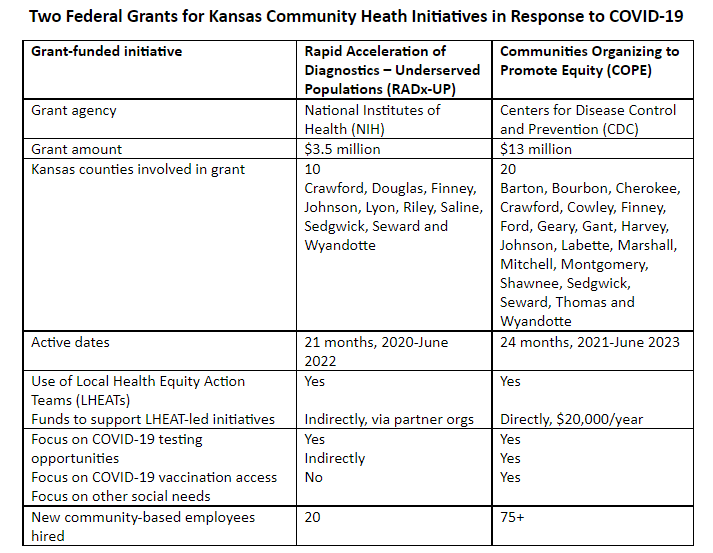
KU Medical Center
KANSAS CITY – The University of Kansas Medical Center recently distributed a total of 22,500 COVID-19 rapid home test kits in 20 Kansas counties, including Thomas County in northwest Kansas.
The kits were sent as part of a new community health initiative funded by a $13 million grant from the Kansas Department of Health and Environment.
The grant was obtained and will be managed by KU Medical Center for a program named Communities Organizing to Promote Equity, or COPE. COPE partners include KU Medical Center, community health clinics, community organizations and health departments within the specified counties. The Centers for Disease Control and Prevention (CDC) made funding available to state health departments to address health equity, particularly in response to COVID-19; however, the funds are not limited to pandemic-related health concerns.
KU Medical Center faculty, staff and students were joined by family members and volunteers from area middle schools and high schools to label and pack the test kits for distribution. Project Lead Sarah Finocchario Kessler, Ph.D., MPH, associate professor of family medicine and community health in the KU School of Medicine, said, “We are very excited to get these tests to partner organizations and families in COPE counties as a great way to launch our program.”
In addition to providing the COVID tests, funds from COPE will be used to hire and train three community health care workers (CHWs) in each county through the grant’s end date of June 2023. Kessler said the CHWs will aim to:
- Build rapport and trust with underserved community members by linking them to needed services
- Facilitate access to COVID-19 testing and vaccinations through partnerships with trusted community-based organizations
- Strengthen the role of community health workers in the public health response to COVID-19 and build health equity in local communities
“This an opportunity to potentially hire from the underserved communities we’re trying to reach and to provide CHWs and community leaders with the budgetary resources needed to put good, practical ideas into practice,” Kessler said.
COPE shares some similarities with another recent community health initiative, RADx-UP. In 2020, KU Medical Center received a two-year grant from the National Institutes of Health (NIH) to support projects designed to rapidly implement COVID-19 testing strategies in populations disproportionally affected by the pandemic. RADx-UP established small community task forces in 10 counties in Kansas. These groups, called Local Health Equity Action Teams, or LHEATs, identified COVID-related inequities in their communities and devised strategies for improvement.
Kessler said the COPE program will adopt the concept of LHEATs and even retain some of the team members who helped in RADx-UP. But more importantly, she said, these new teams will be able to expand health-equity efforts in the state (from 10 counties to 20) and have direct funding to implement strategies designed to reduce barriers and reach people who are often missed by more traditional strategies.
Edward Ellerbeck, M.D., MPH, professor of population health and internal medicine in KU School of Medicine and one of the principal co-investigators of RADx-UP at KU Medical Center, said RADx-UP provided some important insights into the barriers faced by underserved populations in Kansas in getting tested and vaccinated for COVID-19. “COPE builds upon the lessons learned in RADx-UP and takes it to a new level,” he said.
Allen Greiner, M.D., MPH, professor of family medicine and community health in KU School of Medicine and one of principal co-investigators of the medical center’s RADx-UP, said he sees COPE as a way to bring together various partners in the selected urban and rural counties. “Community health services are rarely tied to public health and health care delivery partners such as clinics and hospitals,” Greiner said. “The COPE project aims to build new bridges to improve a variety of health and social outcomes for those in need. COVID and other chronic disease outcomes will improve as a result.”







